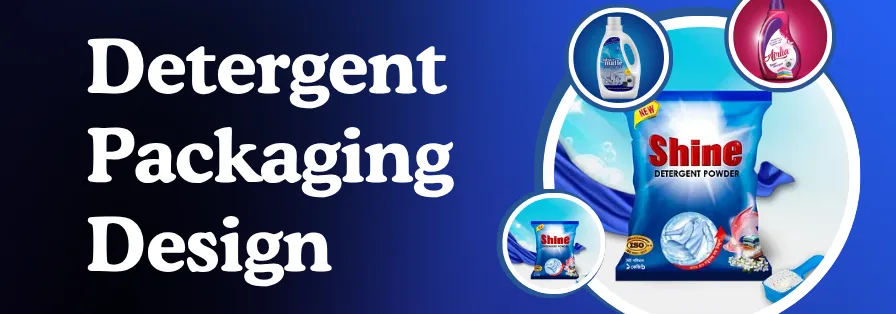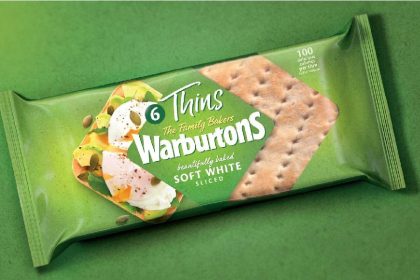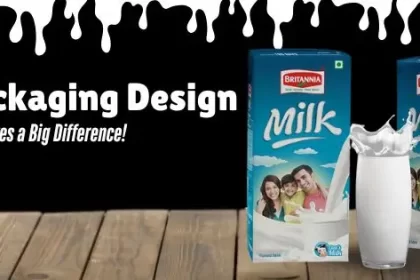When it comes to FMCG products, first impressions are everything. In the world of detergents, where functionality meets emotional connection, Packaging design plays a powerful role in influencing buying decisions. From household shelves to retail aisles, the packaging is often the first touchpoint between the brand and the consumer. A thoughtfully designed detergent package not only reflects the product’s quality but also defines the brand’s identity.
In this blog, we will explore how innovative detergent packaging design can elevate a brand, what key design elements make it effective, and how related elements like soap packaging design and floor cleaner label design contribute to a consistent brand experience.
Understanding the Role of Detergent Packaging Design
The detergent industry is one of the most competitive markets globally. From powder to liquid detergents, brands must constantly innovate their packaging to stand out. The packaging design must serve multiple purposes: it has to attract attention, communicate the product’s purpose, ensure safety, and offer convenience.
A successful detergent packaging design achieves the perfect balance between aesthetics and practicality. It should make consumers feel confident that the product delivers cleanliness, freshness, and value.
Key Elements of an Effective Detergent Packaging Design
1. Brand Identity and Recognition
Your packaging must immediately reflect your brand’s personality. Whether your detergent represents eco-friendliness, affordability, or luxury, the design elements—colors, typography, and visuals—must speak that language.
For example, green tones and earthy designs communicate eco-consciousness, while bright blues and whites often symbolize freshness and purity. A bold logo placement enhances brand recall, helping consumers easily recognize your product in a crowded supermarket.

Source: in.pinterest.com

Source: in.pinterest.com
2. Color Psychology in Packaging
Colors influence consumer emotions. For detergents, blue often represents cleanliness, trust, and water. Yellow conveys energy and brightness, while green promotes a natural or herbal feel. Choosing the right color palette is essential to connect emotionally with your target audience.
If your brand also offers related products like soap packaging design or floor cleaner label design, maintaining color harmony across all product categories ensures visual consistency and builds a stronger brand image.

Source: in.pinterest.com

Source: in.pinterest.com
3. Shape, Material, and Functionality
Packaging structure plays a significant role in user experience. A detergent pouch should be easy to handle and pour, while a bottle should have an ergonomic grip. Brands are now exploring eco-friendly materials and recyclable packaging to reduce environmental impact. The material selection also reflects brand values—for instance, biodegradable plastics or paper-based alternatives appeal to eco-conscious buyers.

Source: in.pinterest.com

Source: in.pinterest.com
4. Typography and Readability
Typography is more than just font choice. It communicates the tone and professionalism of your brand. The label must include clear and legible information about ingredients, usage, and safety instructions. In detergent packaging, using bold, easy-to-read fonts ensures that essential details stand out.

Source: in.pinterest.com

Source: in.pinterest.com
5. Visual Storytelling and Imagery
High-quality visuals help convey the product’s promise. Sparkling clothes, water splashes, or freshness cues instantly create emotional connections. Including lifestyle imagery—such as a family enjoying clean, fresh clothes—adds a relatable, human touch.

Source: in.pinterest.com

Source: in.pinterest.com
The Importance of Sustainability in Detergent Packaging
Today’s consumers are eco-conscious. They prefer brands that demonstrate responsibility toward the planet. Using biodegradable materials, refillable pouches, or recyclable bottles not only appeals to environmentally aware customers but also strengthens your brand’s reputation.
Minimalist design approaches that reduce ink usage or eliminate unnecessary plastic elements can be both aesthetically pleasing and environmentally friendly. Incorporating clear messages such as “100% Recyclable” or “Eco-Safe Formula” enhances consumer trust and brand loyalty.
Balancing Creativity with Practicality
While visual appeal is essential, the packaging must be functional. Leakage, difficult-to-open caps, or poorly designed pouches can frustrate customers. The detergent packaging design should make the product easy to store, use, and dispose of.
Innovative packaging structures such as resealable pouches, dosing caps, or smart bottles with measuring lines improve the user experience and add perceived value.

Source: in.pinterest.com

Source: in.pinterest.com
Consistency Across Product Lines
If your brand offers multiple cleaning products—like soaps, detergents, and floor cleaners—maintaining a consistent visual language across all packaging is crucial. For instance, soap packaging design can mirror the detergent design in tone, color, and typography. Similarly, floor cleaner label design should align with the same brand identity for uniformity across shelves.
This cohesive approach not only reinforces your brand image but also builds consumer trust and recognition. Customers are more likely to choose products from brands that maintain visual and conceptual consistency.

Source: in.pinterest.com

Source: in.pinterest.com

Source: in.pinterest.com
How Detergent Packaging Design Influences Purchase Decisions
Most consumers spend less than 10 seconds choosing a detergent. That means your packaging has only a few moments to make an impact. Eye-catching visuals, clear benefits (like “Removes Tough Stains” or “Gentle on Fabrics”), and well-placed callouts can instantly communicate value.
Attractive packaging can even shift perceptions. For example, premium packaging with metallic finishes, sleek typography, and minimalist layouts can make the product appear high-end, justifying a higher price point.
Trends Shaping Modern Detergent Packaging Design
- Eco-Friendly Packaging: Biodegradable materials, paper-based pouches, and refill packs are gaining traction.
- Minimalist Design: Simple layouts with fewer colors and bold typography give a modern, clean feel.
- Interactive Labels: QR codes or AR-enabled packaging allow consumers to learn more about the product or brand story.
- Transparent Packaging: Clear windows that show the actual product inside enhance trust and authenticity.
- Ergonomic Shapes: Easy-to-use, spill-proof containers improve functionality and convenience.
Integrating Technology into Packaging
Smart packaging is becoming a game-changer. QR codes, NFC tags, and scannable barcodes can provide interactive experiences. Consumers can scan to learn about the detergent’s ingredients, sustainability efforts, or product demos.
For example, a detergent brand could use AR (Augmented Reality) to showcase how effectively its formula removes stains, right from the shelf!

Source: in.pinterest.com

Source: in.pinterest.com

Source: in.pinterest.com
How to Design an Effective Detergent Packaging
Here are practical steps for brands and designers:
- Research the Market: Understand consumer preferences, price ranges, and competitor designs.
- Define Brand Personality: Is your detergent playful, eco-friendly, or luxury-focused?
- Create a Mood Board: Gather color palettes, typography ideas, and packaging inspirations.
- Develop Prototypes: Test the usability and visual appeal of the design.
- Gather Feedback: Conduct surveys or focus groups before finalizing the design.
Linking Product Categories for Stronger Branding
When detergent, soap, and floor cleaner packaging share design elements, it creates a seamless consumer experience. For instance, integrating similar iconography or illustrations across soap packaging design and label design helps customers recognize the brand instantly.
Cross-promotion becomes easier when all packaging follows a unified visual identity. A consumer who trusts your detergent is more likely to try your soap or floor cleaner if the packaging feels familiar and trustworthy.
Conclusion
Effective detergent packaging design is more than just colors and graphics. it’s about storytelling, usability, and brand consistency. It connects functionality with emotions, helping your product shine among competitors. As brands continue to innovate with eco-friendly materials and smart packaging technologies, those that focus on both design and user experience will lead the market.
A powerful design doesn’t just sell detergent—it builds trust, drives loyalty, and keeps your brand sparkling in consumers’ minds.





One Comment
Sarah
November 17, 2025 at 10:14 amwow